
The Sinclair ZX80 is a home computer launched on 29 January 1980 by Science of Cambridge Ltd.. It is notable for being one of the first computers available in the United Kingdom for less than a hundred pounds. It was available in kit form for £79.95, where purchasers had to assemble and solder it together, and as a ready-built version at £99.95.

The ZX Spectrum is an 8-bit home computer developed and marketed by Sinclair Research. Considered one of the most influential computers ever made, it is also one of the best-selling computers ever, with over five million units sold. It was released in the United Kingdom on 23 April 1982, and around the world in the following years, most notably in Europe, the United States, and Eastern Bloc countries.
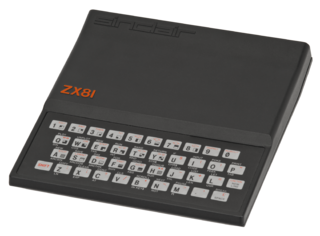
The ZX81 is a home computer that was produced by Sinclair Research and manufactured in Dundee, Scotland, by Timex Corporation. It was launched in the United Kingdom in March 1981 as the successor to Sinclair's ZX80 and designed to be a low-cost introduction to home computing for the general public. It was hugely successful; more than 1.5 million units were sold. In the United States it was initially sold as the ZX-81 under licence by Timex. Timex later produced its own versions of the ZX81: the Timex Sinclair 1000 and Timex Sinclair 1500. Unauthorized ZX81 clones were produced in several countries.

Acorn Computers Ltd. was a British computer company established in Cambridge, England, in 1978. The company produced a number of computers which were especially popular in the UK, including the Acorn Electron and the Acorn Archimedes. Acorn's BBC Micro computer dominated the UK educational computer market during the 1980s.
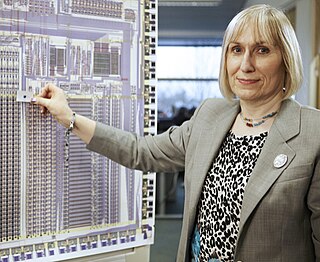
Sophie Mary WilsonDistFBCS is an English computer scientist, a co-designer of the Instruction Set for the ARM architecture.

Sir Clive Marles Sinclair was an English entrepreneur and inventor, best known for being a pioneer in the computing industry and also as the founder of several companies that developed consumer electronics in the 1970s and early 1980s.

Stephen Byram Furber is a British computer scientist, mathematician and hardware engineer, and Emeritus ICL Professor of Computer Engineering in the Department of Computer Science at the University of Manchester, UK. After completing his education at the University of Cambridge, he spent the 1980s at Acorn Computers, where he was a principal designer of the BBC Micro and the ARM 32-bit RISC microprocessor. As of 2023, over 250 billion ARM chips have been manufactured, powering much of the world's mobile computing and embedded systems, everything from sensors to smartphones to servers.

Jetpac is a shooter video game developed and published by Ultimate Play the Game and released for the ZX Spectrum and VIC-20 in 1983 and the BBC Micro in 1984. It is the first game to be released by Ultimate Play the Game, the company which later became Rare. The game follows Jetman as he must rebuild his rocket in order to explore different planets, while simultaneously defending against hostile aliens. It was written by Ultimate co-founder Chris Stamper with graphics designed by his brother, Tim Stamper. Reviewers praised Jetpac's presentation and gameplay, and it won "Game of the Year" at the Golden Joystick Awards in 1983.
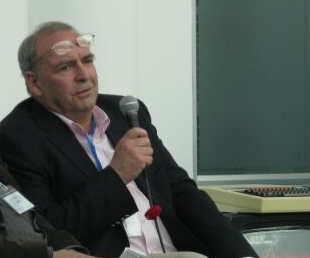
Christopher Curry is the co-founder of Acorn Computers, with Hermann Hauser and Andy Hopper. He became a millionaire as a result of Acorn's success.
Sinclair Research Ltd was a British consumer electronics company founded by Clive Sinclair in Cambridge. It was originally incorporated in 1973 as Westminster Mail Order Ltd, renamed Sinclair Instrument Ltd, then Science of Cambridge Ltd, then Sinclair Computers Ltd, and finally Sinclair Research Ltd. It remained dormant until 1976, when it was activated with the intention of continuing Sinclair's commercial work from his earlier company Sinclair Radionics, and adopted the name Sinclair Research in 1981.
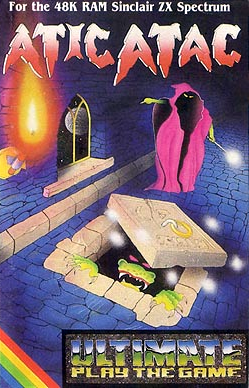
Atic Atac is an arcade-adventure video game developed and published by Ultimate Play the Game, released for the ZX Spectrum in 1983 and the BBC Micro in 1985. The game takes place within a castle in which the player must seek out the "Golden Key of ACG" by unlocking doors and avoiding enemies. It was Ultimate's second game to require 48K of RAM; most of their previous games for the Spectrum ran on unexpanded 16K models.
Jim Westwood is the former chief engineer who worked at Sinclair Research Ltd in the 1980s, starting at the company in 1963. Westwood was the technical mastermind behind many of Sinclair's products and worked there for more than twenty years.

Artic Computing was a software development company based in Brandesburton, England from 1980 to 1986. The company's first games were for the Sinclair ZX81 home computer, but they expanded and were also responsible for various ZX Spectrum, Commodore 64, BBC Micro, Acorn Electron and Amstrad CPC computer games. The company was set up by Richard Turner and Chris Thornton. Charles Cecil, who later founded Revolution Software, joined the company shortly after it was founded, writing Adventures B through D. Developer Jon Ritman produced a number of ZX81 and Spectrum games for Artic before moving to Ocean Software.
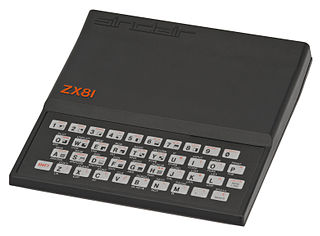
Rick Dickinson was a British industrial designer who developed pioneering computer designs in the 1980s. Notable examples of his design work include the ZX81 case and touch-sensitive keyboard and the ZX Spectrum's rubber keyboard.

The Computer Programme is a TV series, produced by Paul Kriwaczek, originally broadcast by the BBC in 1982. The idea behind the series was to introduce people to computers and show them what they were capable of. The BBC wanted to use their own computer, so the BBC Micro was developed by Acorn Computers as part of the BBC Computer Literacy Project, and was featured in this series. The series was successful enough for two series to follow it, namely Making the Most of the Micro in 1983 and Micro Live from 1984 until 1987.

The BBC Microcomputer System, or BBC Micro, is a series of microcomputers designed and built by Acorn Computers Limited in the 1980s for the Computer Literacy Project of the BBC. The machine was the focus of a number of educational BBC TV programmes on computer literacy, starting with The Computer Programme in 1982, followed by Making the Most of the Micro, Computers in Control in 1983, and finally Micro Live in 1985.

The Centre for Computing History is a museum in Cambridge, England, established to create a permanent public exhibition telling the story of the Information Age.

The Baron of Beef is a pub in Bridge Street, Cambridge, England, owned by Bob Jones.

The ZX Spectrum Vega is a modern redesign of the ZX Spectrum in the form of a miniaturised TV game, created with the involvement of Sir Clive Sinclair. It comes preloaded with several games for the platform.

















